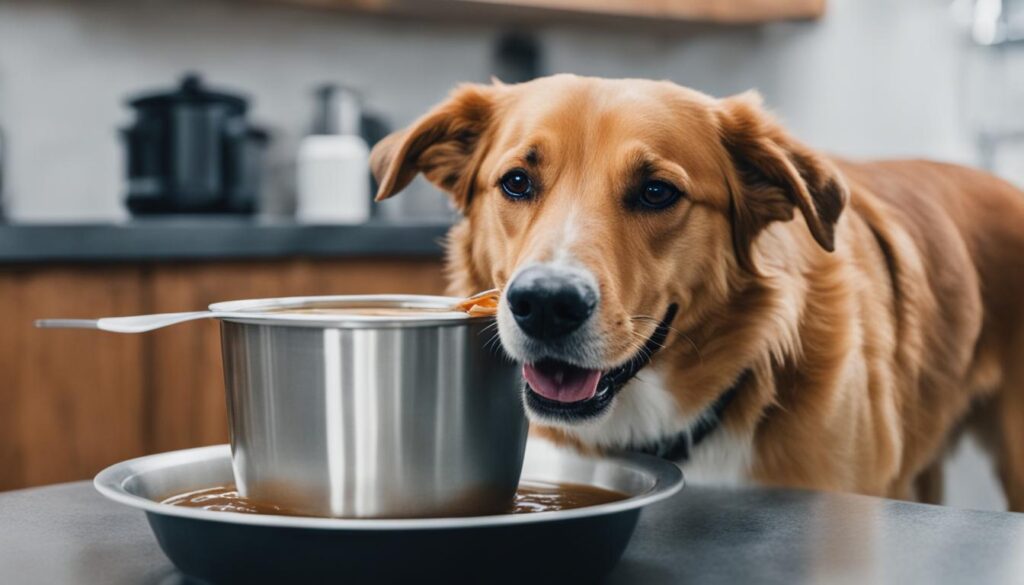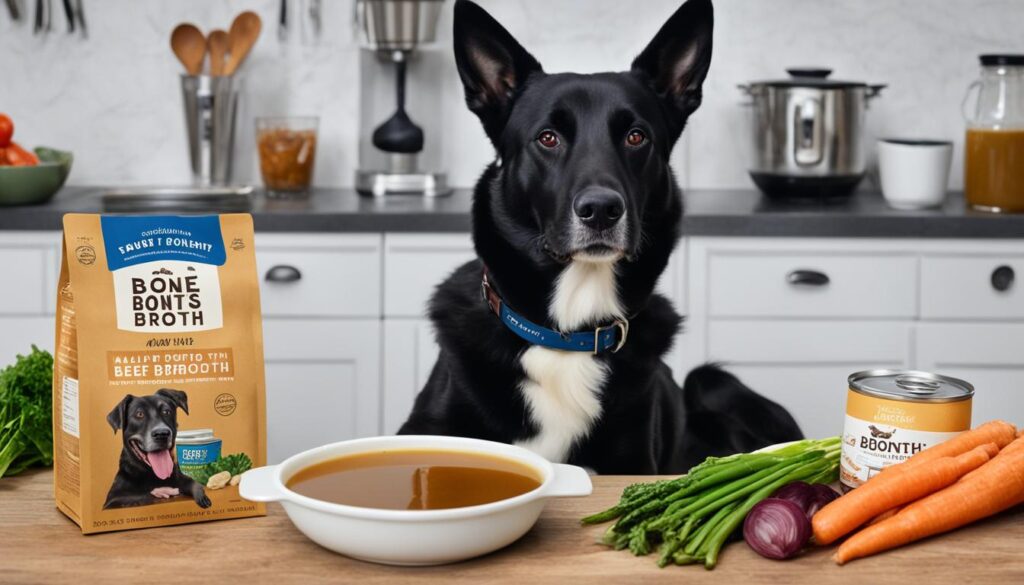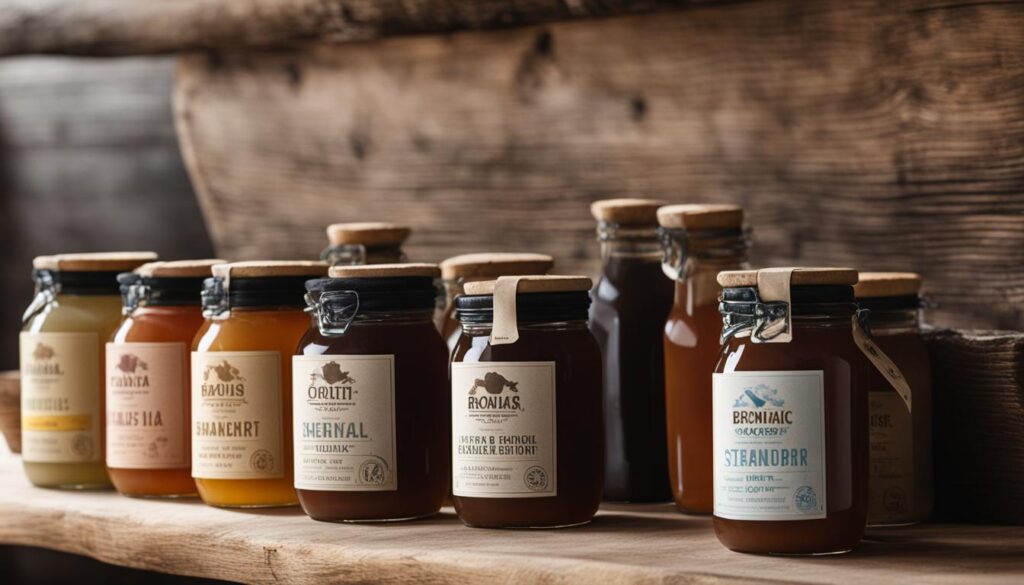Hello, my name is John and I’m excited to share important information about beef broth and its suitability for dogs. As a pet nutrition expert, I understand the significance of providing our furry friends with a balanced and safe diet. Today, I’ll be addressing common questions such as “Can dogs have beef broth?” and discussing the benefits, precautions, and homemade options for feeding beef broth to dogs.
Key Takeaways:
- Beef broth can be safe for dogs if prepared correctly and free from harmful ingredients like sodium, onions, and garlic.
- Benefits of beef broth for dogs include hydration, digestion support, skin and coat improvement, and joint health promotion.
- Precautions for giving beef broth to dogs include avoiding it for dogs with beef allergies or specific dietary restrictions and not replacing regular dog food with beef broth.
- Homemade beef broth can be a healthy option, but it’s important to remove bones and harmful ingredients like onions and garlic.
- Beef broth versus chicken broth depends on individual preferences and dietary needs, but both can be safe for dogs.
Can Dogs Eat Beef Broth?

Dogs can safely eat beef broth that is properly prepared and free from harmful ingredients like sodium, onions, and garlic. However, it is important to note that not all beef broth is suitable for dogs, especially if it is used for cooking purposes. Many commercially available beef broths may contain high levels of sodium or unsafe additives.
To ensure that dogs can enjoy beef broth without any health risks, it is recommended to use plain beef broth that has been simmered with unseasoned meat, bones, and organs. This homemade beef broth should not contain any harmful ingredients and should have all solids, especially bones, removed before being given to dogs.
When introducing beef broth to a dog’s diet, it is crucial to be mindful of the source and preparation method. Homemade beef broth, made with high-quality ingredients and without harmful additives, is the best option for ensuring the safety and nutritional value of the broth.
It is worth mentioning that beef broth should not replace a dog’s regular food and should be given in moderation. While beef broth can provide hydration and some essential nutrients, it does not offer a complete and balanced diet for dogs. It is always recommended to consult with a veterinarian before incorporating any new food into a dog’s diet, including beef broth.
By following these precautions and guidelines, dogs can enjoy the taste and benefits of beef broth without any adverse effects on their health.
Health Benefits of Beef Broth for Dogs
Beef broth offers several health benefits for dogs. It serves as a source of hydration, making it especially beneficial for dogs recovering from an upset stomach. The presence of collagen in beef broth helps nourish the skin and coat, promoting healthier and less brittle hair. Additionally, beef broth contains essential substances such as glucosamine, chondroitin, and hyaluronic acid, all of which support joint health and mobility in dogs.
Reputable brands may enrich beef broth with essential vitamins and minerals that contribute to a dog’s overall well-being. These added nutrients help fulfill daily dietary requirements and support optimal body function. Furthermore, beef broth can stimulate a dog’s appetite, making it an effective tool for encouraging underweight dogs to eat more.
“Beef broth provides hydration, nourishes the skin and coat, and supports joint health in dogs.” – Dr. Jane Thompson, Veterinarian
Precautions for Giving Beef Broth to Dogs
While beef broth is generally safe for dogs, it is important to take certain precautions to ensure their well-being. Here are some key considerations when giving beef broth to dogs:
- Avoid Beef Allergies: If your dog has a known beef allergy, it is best to avoid giving them beef broth. Opt for broths made from alternative protein sources that are safe for your dog.
- Avoid Salty Broth: Ensure that the beef broth you give to your dog is not salted. Excessive sodium can be harmful to dogs and may lead to health issues.
- Supplement, Not Replace: Remember that beef broth should not be used as a replacement for regular dog food. It should be given as a supplement or treat in addition to their regular balanced diet.
- Dietary Restrictions: If your dog has specific dietary restrictions, such as limitations on protein or fat intake, consult with your veterinarian before introducing beef broth into their diet. They can advise on the suitability and appropriate quantity of beef broth for your dog.
- Considerations for Certain Dogs: Large-breed puppies and dogs with kidney or liver issues may require regulated protein consumption. Speak to your vet to determine if beef broth is suitable for your dog’s specific needs.
Consulting a veterinarian
To ensure the health and well-being of your dog, it is always recommended to consult with a veterinarian before incorporating beef broth into their diet. A veterinarian can provide personalized advice based on your dog’s individual needs, taking into account any specific dietary restrictions, health conditions, or allergies they may have. They can guide you on the appropriate amount of beef broth to give and help you make informed decisions regarding your dog’s nutrition.
By following these precautions and consulting with your veterinarian, you can safely incorporate beef broth into your dog’s diet and provide them with a tasty and nutritious treat.
Homemade Beef Broth for Dogs

When it comes to providing your furry friend with a nutritious and delicious treat, homemade beef broth is a fantastic option. By preparing your own beef broth, you have complete control over the ingredients and can ensure it is tailored specifically to your dog’s needs. Not only is homemade beef broth easy to make, but it also offers a range of health benefits for your canine companion.
Ingredients for Homemade Beef Broth
To make homemade beef broth for dogs, you’ll need a few simple ingredients:
- Unseasoned meat, bones, and organs
- Dog-friendly herbs like oregano, thyme, and rosemary
- Nutritious vegetables such as carrots, potatoes, and celery
These ingredients work together to create a flavorful and nutrient-rich broth that your dog will love.
Preparing Homemade Beef Broth
Follow these steps to prepare homemade beef broth for your furry friend:
- Simmer the unseasoned meat, bones, and organs in a pot of water.
- Add the dog-friendly herbs and vegetables to the pot.
- Allow the broth to simmer for several hours, ensuring that the flavors meld together.
- Once fully cooked, strain the broth to remove any solids, especially bones, as they can pose a choking hazard to your dog.
- Let the broth cool before serving it to your pup.
Remember, homemade beef broth should be given to your dog in moderation and not as a meal replacement. It’s a nutritious addition to their diet, but it shouldn’t be the sole source of nutrition.
Homemade beef broth provides a host of benefits for your dog. It can help with hydration, aid in digestion, and improve their overall health and well-being. Additionally, it’s a great way to show your pup some extra love and attention by providing them with a tasty and nourishing treat.
Before introducing homemade beef broth to your dog’s diet, it’s always a good idea to consult with your veterinarian. They can offer personalized advice based on your dog’s specific dietary needs and ensure that beef broth is a suitable addition to their meal plan.
Beef Broth Versus Chicken Broth for Dogs

When it comes to choosing between beef broth and chicken broth for dogs, both options can be safe and beneficial when prepared correctly. Each type of broth has its own unique advantages, so the decision depends on the individual dog’s preferences and dietary needs.
Beef broth offers additional benefits for dogs, such as a higher collagen content that promotes healthy skin and coat. It also contains glucosamine, chondroitin, and hyaluronic acid, which support joint health and mobility. These components can be especially beneficial for dogs with joint issues or those prone to skin problems.
On the other hand, chicken broth may be more easily digested by dogs with sensitive stomachs. It is lighter and milder in flavor, which can make it a suitable choice for dogs that have trouble tolerating beef or are picky eaters.
Ultimately, the choice between beef broth and chicken broth should be based on the individual dog’s preferences and dietary requirements. Some dog owners may find that their pets enjoy the taste and benefits of beef broth, while others may opt for the gentler digestion of chicken broth. It’s important to observe your dog’s reactions and consult with a veterinarian to determine which type of broth is best for their specific needs.
Importance of Consulting a Veterinarian

When it comes to introducing beef broth to your dog’s diet, it’s crucial to consult a veterinarian. This is especially important if your dog has specific dietary restrictions, health issues, or food sensitivities. A veterinarian can provide personalized advice based on your dog’s specific needs, ensuring that the introduction of beef broth is safe and appropriate.
Consulting a veterinarian allows you to have a professional assessment of your dog’s overall health and nutritional requirements. They can guide you in determining the appropriate amount of beef broth to give your dog. It’s important to remember that beef broth should be used as a supplement or treat and not as a meal replacement.
Your veterinarian can also help in identifying any potential risks or considerations related to your dog’s specific health condition. They can provide insights and recommendations on how beef broth can fit into your dog’s existing diet and treatment plan, ensuring optimal nutrition and well-being.
Benefits of Consulting a Veterinarian
When you consult a veterinarian regarding beef broth for your dog, you gain access to their expertise and professional knowledge. They can provide the following benefits:
- Personalized advice tailored to your dog’s specific needs
- Guidance on appropriate portion sizes and frequency of beef broth consumption
- Identification of potential allergic reactions or adverse effects
- Recommendations on alternative options for dogs with dietary restrictions
- Insights into any potential interactions between beef broth and existing medications
By consulting a veterinarian, you can ensure that the introduction of beef broth into your dog’s diet is supported by professional guidance, promoting your dog’s health and well-being.
Consulting a Veterinarian for Beef Broth: Testimonials
“As a veterinarian, I always encourage pet owners to consult with me before making any significant changes to their dog’s diet. This includes introducing new food or treats like beef broth. Each dog is unique, and what works for one may not work for another. By consulting a veterinarian, pet owners can ensure that they are providing nutrition that aligns with their dog’s specific needs.” – Dr. Emily Thompson, DVM
“I’ve seen instances where dogs have experienced digestive upset or allergic reactions to certain types of broth. Consulting a veterinarian allows pet owners to make informed decisions and minimize any potential risks. It’s always best to have professional advice when it comes to your pet’s nutrition.” – Dr. Michael Davis, DVM
Consulting a Veterinarian for Beef Broth: A Wise Choice for Your Dog’s Health
The importance of consulting a veterinarian before incorporating beef broth into your dog’s diet cannot be overstated. By seeking professional advice, you can ensure that you are making choices that align with your dog’s specific needs and promote their overall health and well-being. Remember, the health of your furry friend is best entrusted to the expertise of a veterinarian.
Bone Broth as a Substitute for Beef Broth

If a dog cannot have beef broth due to allergies or other reasons, bone broth can be a suitable alternative. Bone broth is made by slowly cooking animal bones for an extended period, resulting in a nutrient-rich liquid that provides similar health benefits to beef broth. It is important to choose bone broth made from natural, dog-safe ingredients and free from additives like onions, garlic, and salt. Commercial bone broth products specifically formulated for dogs are available and can be a convenient and safe option.
When selecting a bone broth for dogs, it’s crucial to ensure that it is made from high-quality, natural ingredients. Look for bone broth products that are specifically designed for dogs, as they are more likely to meet their nutritional needs and be free from harmful additives. Brands like Bluebird Provisions offer premium bone broth made from organic, human-grade ingredients. These bone broths are carefully cooked to extract maximum nutrients and provide a healthy and flavorful option for dogs.
Bone broth can be used in various ways to benefit dogs. It can be served as a delicious treat on its own or used as a flavorful addition to their regular meals. Some dog owners even use bone broth to entice picky eaters or to rehydrate dry kibble. The rich taste and aroma of bone broth can make mealtime more enjoyable for dogs and encourage them to eat.
Benefits of Bone Broth for Dogs
Bone broth offers a range of benefits for dogs. It is rich in collagen, which supports joint health and can help alleviate joint pain and inflammation. The gelatin found in bone broth aids in digestion and promotes a healthy gut. Bone broth is also packed with essential nutrients, including vitamins, minerals, and amino acids, that are beneficial for overall health and well-being.
In addition to its nutritional value, bone broth can also be beneficial for dogs with certain health conditions. For example, it can be soothing for dogs with upset stomachs, as it is gentle on the digestive system. The warm liquid can provide comfort and hydration to dogs recovering from illness or surgery. The flavorful broth can also be used to make homemade dog treats or freeze it into ice cube trays for a refreshing snack on hot days.
Recommended Bone Broth Brands for Dogs

| Brand | Description | Benefits | Price |
|---|---|---|---|
| Bluebird Provisions | Bluebird Provisions offers high-quality, human-grade bone broth made from organic ingredients. | – Sourced from local farms – Free from harmful additives, preservatives, and allergens |
$15.99 |
When choosing bone broth for dogs, it’s essential to select trusted brands that offer high-quality, human-grade bone broth made from organic ingredients. One recommended brand is Bluebird Provisions, known for producing the highest quality bone broth for dogs. Their bone broth is made from bones sourced from local farms and is free from harmful additives, preservatives, and allergens. Bluebird Provisions bone broth is available for purchase on Amazon Prime.
Dosage and Precautions for Feeding Bone Broth to Dogs
When it comes to feeding bone broth to dogs, it’s important to consider the appropriate dosage and take necessary precautions to ensure their well-being. Bone broth can provide numerous health benefits, but like any dietary addition, it should be introduced gradually and in the right amounts to prevent any adverse reactions.
Dosage Recommendations
It is advisable to start with a small amount of bone broth and gradually increase the dosage over time. This approach allows you to monitor your dog’s tolerance and observe any potential digestive issues. A quarter cup of liquid bone broth or approximately 1 teaspoon of bone broth powder mixed with a meal a few times per week is a suitable starting point. However, keep in mind that individual dogs may have different tolerances, so it’s essential to adjust the dosage based on their specific needs and reactions.
Precautions to Consider
While bone broth is generally safe for dogs, it’s crucial to be aware of certain precautions to ensure their health and well-being:
- Dietary Restrictions: Dogs with specific dietary restrictions, such as allergies or intolerances, may react negatively to bone broth. If your dog has any known dietary restrictions, consult with a veterinarian before incorporating bone broth into their diet.
- Monitor Digestive Health: Keep a close eye on your dog’s digestive system when introducing bone broth. Watch out for any signs of diarrhea, vomiting, or other adverse reactions. If your dog experiences these symptoms, it may be necessary to reduce or discontinue the bone broth consumption.
- Quality and Ingredients: Choose bone broth made from high-quality ingredients and free from additives like onions, garlic, and excessive salt. It’s advisable to opt for reputable brands that prioritize the safety and nutritional value of their products.
By following these dosage recommendations and precautions, you can ensure a positive and beneficial experience when feeding bone broth to your beloved canine companion.
Preparing Homemade Bone Broth for Dogs
Homemade bone broth for dogs is a nutritious and wholesome addition to their diet. By simmering animal bones at a low heat for an extended period, you can create a nourishing broth that is packed with essential nutrients.
Wrapping Up about beef broth for dogs
In conclusion, beef broth can be a safe and nutritious addition to a dog’s diet when prepared correctly. It offers various health benefits, including hydration, digestive support, skin and coat improvement, and joint health promotion. Dogs can enjoy homemade beef broth or bone broth from reputable brands, ensuring the use of dog-safe ingredients.
However, it’s important to remember that beef broth should be given in moderation and not replace regular dog food. Dogs with specific dietary restrictions or health issues should consult a veterinarian before incorporating beef broth into their diet. A veterinarian can provide personalized advice and guidance based on the dog’s individual needs.
With careful consideration and consultation, beef broth can be a tasty and nutritious treat for dogs, enriching their meals and enhancing their overall well-being. So, if you’re considering adding some flavor and nutritional benefits to your dog’s diet, why not give beef broth a try? Just ensure that you prepare it with the right ingredients and consult with a professional for the best results.
FAQ
Can dogs have beef broth?
Yes, dogs can have beef broth as long as it’s prepared correctly and free from harmful ingredients like sodium, onions, and garlic.
Is beef broth safe for dogs?
Beef broth is safe for dogs when prepared correctly and does not contain salt or harmful ingredients. However, dogs with beef allergies or specific dietary restrictions should avoid beef broth.
What are the benefits of beef broth for dogs?
Beef broth can provide hydration, aid in digestion, improve skin and coat health, support joint health, and offer essential nutrients for dogs.
How can I give dogs beef broth?
You can give dogs beef broth by serving it as a treat, pouring it over their regular dog food, or freezing it into a tasty frozen treat.
Can I make homemade beef broth for dogs?
Yes, you can make homemade beef broth for dogs by simmering unseasoned meat, bones, and organs with dog-friendly herbs and vegetables. However, it’s important to remove all solids, especially bones, before giving it to dogs.
Are there any precautions for giving beef broth to dogs?
Yes, precautions for giving beef broth to dogs include avoiding sodium, onions, and garlic, not using it as a meal replacement, and being cautious with dogs with allergies or specific dietary restrictions.
What is the nutritional value of beef broth for dogs?
Beef broth can provide hydration, protein, and essential nutrients like collagen, glucosamine, chondroitin, and hyaluronic acid for dogs.
Is beef broth better than chicken broth for dogs?
Both beef broth and chicken broth can be safe for dogs. However, beef broth offers additional benefits like higher collagen content and joint health support.
Why is it important to consult a veterinarian before giving beef broth to dogs?
It’s important to consult a veterinarian before giving beef broth to dogs, especially if they have specific dietary restrictions, health issues, or food sensitivities. A veterinarian can provide personalized advice and ensure the dog’s safety and well-being.
Can bone broth be a substitute for beef broth for dogs?
Yes, bone broth can be a suitable alternative to beef broth for dogs. It offers similar health benefits and can be made from various animal bones like beef, chicken, lamb, duck, bison, or fish.
Are there any recommended bone broth brands for dogs?
Yes, Bluebird Provisions is a recommended brand known for producing high-quality bone broth for dogs. Their bone broth is made from bones sourced from local farms and is free from harmful additives, preservatives, and allergens.
What are the dosage and precautions for feeding bone broth to dogs?
The dosage and precautions for feeding bone broth to dogs may vary. It’s important to start with a small amount and gradually increase the dosage, monitor the dog’s reaction, and reduce or stop consumption if any adverse reactions occur.
How can I prepare homemade bone broth for dogs?
Homemade bone broth for dogs can be made by simmering animal bones from sources like beef, chicken, lamb, duck, bison, or fish with dog-safe ingredients and omitting harmful ingredients like onions, garlic, and excessive salt.






